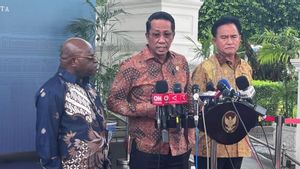JAKARTA - Sexual violence against women is a violation of human rights which is physically, mentally and socially detrimental to victims. Cases of sexual violence not only cause trauma to women, but also exacerbate gender inequality in society.
Therefore, the prevention and handling of sexual violence against women is urgent to be handled seriously by various parties, ranging from individuals, families, communities, to the state.
The government has issued the Law on the Crime of Sexual Violence Number 12 of 2022 (TPKS Law) as a legal umbrella governing sanctions and handling cases of sexual violence.
This law regulates the prevention of all forms of sexual violence, handling, protection, and restoring victims' rights, coordination between the Central Government and the Regional Government, and international cooperation so that the prevention and handling of victims of sexual violence can be carried out effectively.
In addition, community involvement in the prevention and recovery of victims is also regulated in order to create environmental conditions that are free from sexual violence. However, this regulation also requires support from the private sector.
"The collaboration between the private sector and the government is important to ensure that this issue of sexual violence can be a broad concern," said Assistant Deputy for the Protection of Women's Rights at Home and Vulnerable Ministry of PPPA Eni Widiyanti, SE, MPP., MSE when met in Menteng, Jakarta on Friday, December 13, 2024.
"We appreciate the steps that have been taken by Gojek, not only in its seriousness to take preventive steps through education and technology," he continued.
Eni said the purpose of this law is to provide a sense of security to the community, especially women and children, from acts of sexual violence, and create a more responsive protection system for victims.
"As the TPKS Law has passed, we hope that this collaborative effort can be a step forward for us to realize Indonesia's free of sexual violence," he added.
The Ministry of PPPA feels the importance of a sense of security from sexual violence in public spaces. Therefore, the Ministry of PPPA also invites private sectors to collaborate to prevent sexual violence against women.
SEE ALSO:
On the other hand, Gojek also emphasized the three pillars of security, namely education, technology and protection. This can protect the Gojek ecosystem optimally.
Since 2019, for 6 consecutive years, a series of anti-sexual trainings have been carried out face-to-face in dozens of operational cities or online targeting Gojek Driver Partners.
Training was also given to members of the Gojek Emergency Unit Team on duty 24/7 in response to an emergency. The training includes identification, assistance steps, to the reporting process and knowledge related to the Law on the Crime of Sexual Violence Number 12 of 2022 (TPKS Law).
The English, Chinese, Japanese, Arabic, and French versions are automatically generated by the AI. So there may still be inaccuracies in translating, please always see Indonesian as our main language. (system supported by DigitalSiber.id)















